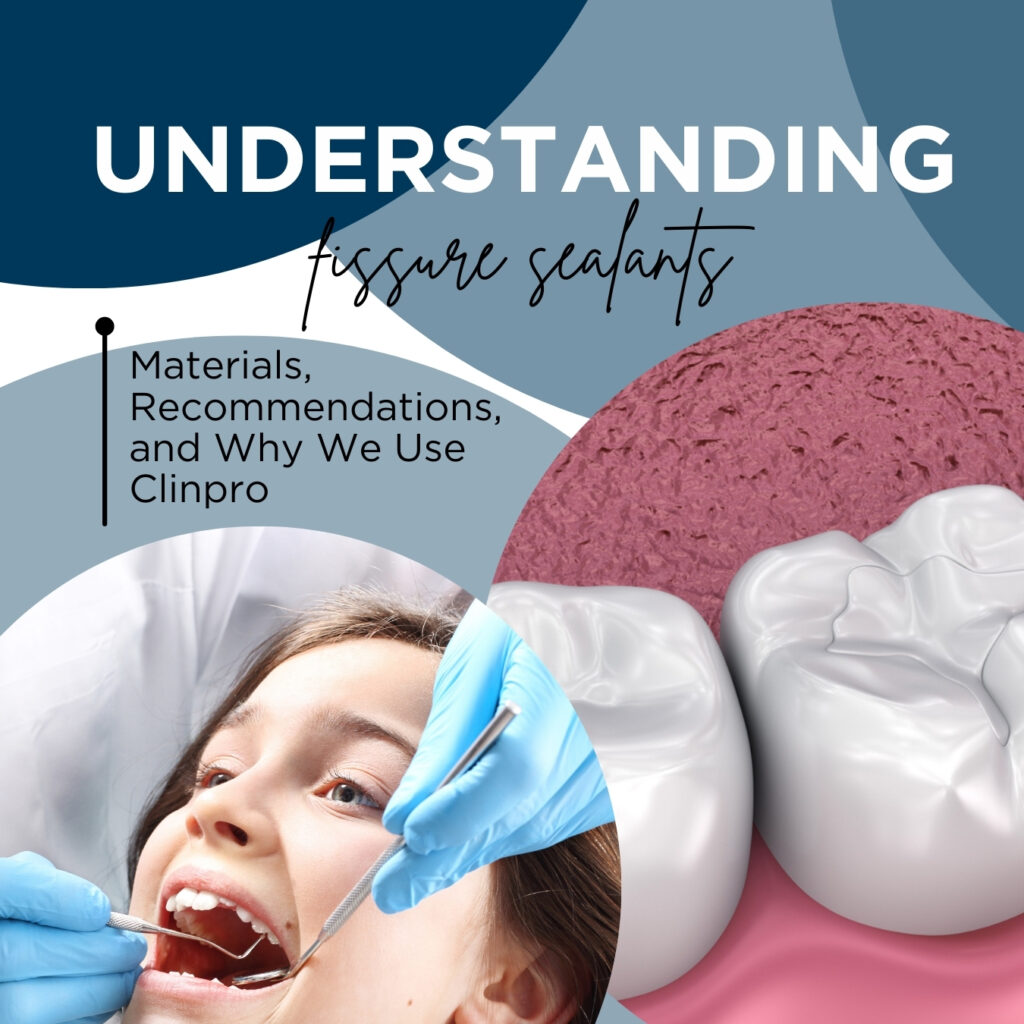Understanding Fissure Sealants: Materials, Recommendations, and Why We Use Clinpro
Fissure sealants are a vital preventive measure in dental care, particularly for children and adolescents. They help protect the chewing surfaces of teeth from decay. In this blog, we’ll explore the materials used in fissure sealants, when we recommend them, and why Clinpro is our preferred choice for our patients.
What Are Fissure Sealants?
Fissure sealants are thin, protective coatings applied to the chewing surfaces of the back teeth (molars and premolars). These teeth have grooves and pits that are prone to trapping food particles and bacteria, leading to tooth decay. Sealants form a smooth, protective barrier over these vulnerable areas, preventing cavities.
Materials Used in Fissure Sealants
- Resin-Based Sealants
- Composition: Made from plastic (resin) materials, resin-based sealants are commonly used due to their durability and effectiveness.
- Advantages: Strong adhesion to the tooth surface, good wear resistance, and effective in preventing decay.
- Types: Light-cured (hardened using a dental curing light) and self-cured (hardened by chemical reaction).
- Glass Ionomer Sealants
- Composition: Made from a mixture of glass and organic acid, these sealants release fluoride, which can help in remineralizing the enamel.
- Advantages: Fluoride release, easy application, and good adhesion to wet surfaces.
- Disadvantages: Generally less durable than resin-based sealants and may need to be reapplied more frequently.
When Do We Recommend Fissure Sealants?
We recommend fissure sealants for:
- Children and Adolescents: The most common age group for sealant application is between 6 and 14 years, as this is when the permanent molars and premolars erupt.
- High Risk of Cavities: Patients who are at high risk for tooth decay, including those with deep grooves and pits in their teeth or a history of cavities, can benefit significantly from sealants.
- First Permanent Molars: Typically around the age of 6, and second permanent molars around the age of 12, when these teeth have fully erupted.
Why We Use Clinpro Sealant
Clinpro is a light-cured, resin-based sealant that offers several advantages over other sealants. In our practice, we prefer Clinpro sealant for several compelling reasons:
- Color Change Technology: Clinpro sealant contains a unique color change technology that changes from pink when applied to white after curing. This feature ensures precise application, allowing the dentist to see exactly where the sealant is being placed, and confirms complete coverage.
- Reference Study: Studies have shown that color change technology enhances the accuracy and effectiveness of sealant application, reducing the risk of missed spots and ensuring better protection against decay.
- Fluoride Release: Clinpro sealant releases fluoride, which helps in preventing decay by strengthening the enamel and promoting remineralization.
- Clinical Evidence: Research indicates that fluoride-releasing sealants like Clinpro provide added protection against cavities, especially in high-risk patients.
- Durability: Clinpro sealant is known for its excellent adhesion and wear resistance, providing long-lasting protection for the chewing surfaces of teeth.
- Scientific Backing: Clinical trials have demonstrated the durability of Clinpro sealant, showing high retention rates and effective caries prevention over extended periods.
- Easy Application: The smooth flow and handling properties of Clinpro make it easy to apply, ensuring a quick and comfortable procedure for patients.
- Handling Properties: Dentists report high satisfaction with the application process of Clinpro sealant, citing its ease of use and reliable performance.
Are Fissure Sealants Worth the Money?
Most dental professionals agree that fissure sealants are a worthwhile investment, particularly for children and teenagers whose permanent teeth are more susceptible to decay. Here’s why:
- Effectiveness: Studies have shown that sealants reduce the risk of decay in molars by nearly 80% in the first two years after application and continue to be effective up to four years.
- Preventive Care: Investing in preventive measures like sealants can save significant amounts of money and discomfort associated with treating dental issues later.
- Endorsements: Leading dental health organizations, such as the Australian Dental Association (ADA), endorse the use of sealants as an effective preventive tool.
Potential Drawbacks
While fissure sealants are highly beneficial, they are not without some minor considerations:
- Periodic Reapplication: Sealants can wear down over time and may need to be reapplied every few years.
- Not a Substitute for Good Oral Hygiene: Sealants are an added layer of protection, not a replacement for brushing, flossing, and regular dental check-ups.
Fissure sealants are a simple yet highly effective preventive measure to protect teeth from decay. We recommend them particularly for children and adolescents with newly erupted permanent molars and those at high risk for cavities. By using Clinpro sealant, we ensure our patients receive the best possible protection due to its unique color change technology, fluoride release, durability, and ease of application.
If you have any questions about fissure sealants or would like to discuss whether they are right for you or your child, feel free to ask during your next visit. We are committed to providing top-notch preventive care to help you maintain a healthy, beautiful smile!
References:
- Journal of Dental Research: Studies on the effectiveness of color change technology in sealants.
- Clinical trials on the durability and caries prevention of Clinpro sealant.
- Research on fluoride release and its benefits in preventive dental care.



